BlogLine
Maintaining confidence in confidants: the Sixth Circuit upholds the attorney-client privilege in the context of internal investigations
9/16/25

By: Grant A. Biggs
In the face of looming bankruptcy, FirstEnergy Solutions, an Ohio electric utility company, was saved in 2019 by House Bill 6, which flipped the script on renewable energies and subsidized the energy company to the tune of $1.3 billion. But no lunch is free, and this one was particularly costly—over $60 million dollars was wired by FirstEnergy to Generation Now, a 501(c)(4) organization controlled by Ohio House Speaker Larry Householder, who used the payments for his own personal benefit and to gain support for his candidacy as Speaker. After winning the speakership in January 2019, House Bill 6 passed just five months later and officially became law in October 2019.
When Householder was arrested for racketeering in July 2020, FirstEnergy immediately hired Jones Day—while its board of directors hired Squire Patton Boggs—to conduct internal investigations in anticipation of litigation. This proved prudent, as FirstEnergy became mired in multiple lawsuits, criminal and civil subpoenas, and federal and state investigations.
One of these lawsuits was a class of investors who sued for securities fraud and sought the results of the investigations the lawyers produced. The district court, in a shocking decision, ordered these results produced to the plaintiffs, alarming boardrooms and law firms throughout the nation. In doing so, the district court found that because the investigations were conducted for business purposes, rather than a predominantly legal purpose, the attorney-client privilege and work-product doctrine did not apply.
An amicus brief signed by thirty-nine law firms pleaded the Sixth Circuit Court of Appeals to stay that order pending resolution of FirstEnergy’s petition for a writ of mandamus. The Court of Appeals granted this request, finding that the district court likely erred in applying the attorney-client privilege and work-product doctrine, and corrected the record.
In applying the attorney-client privilege, the Court of Appeals held, it is irrelevant why the legal advice was requested or given. All that matters is whether the subject communication constitutes “legal advice,” or in other words, whether the communication’s primary purpose is to request or give interpretation and application of legal principles to guide future conduct or to assess past conduct. Here, where the investigations were launched as a result of Householder’s arrest, the doctrine directly applies and serves to protect the results of the investigations. Furthermore, the court noted, the district court’s interpretation would swallow the attorney-client privilege whole as it would be rare to find a corporation that did not seek legal advice primarily to serve a business-related purpose. The court also found that the work-product doctrine serves to protect the results of the internal investigations, as they were performed in anticipation of litigation.
By concluding that such communications are privileged, the Sixth Circuit not only aids corporations in maintaining legal compliance, but as a result, ensures public safety is prioritized as well. In allowing internal investigations to remain confidential, corporations are incentivized to freely share information with counsel, who are able to provide candid legal advice that facilitates compliance with law. This legal compliance, in turn, plays a critical role in protecting the public—particularly when it involves industries that affect health, safety and the environment. By ensuring that companies can proactively identify and correct potential violations without fear of exposure, the legal framework fosters safer business practices, reduces the risk of harm to consumers and the public at large, and reinforces accountability within corporate operations. Everyone wins.
For more information, please contact Grant A. Biggs at grant.biggs@fmglaw.com or your local FMG attorney.
Information conveyed herein should not be construed as legal advice or represent any specific or binding policy or procedure of any organization. Information provided is for educational purposes only. These materials are written in a general format and not intended to be advice applicable to any specific circumstance. Legal opinions may vary when based on subtle factual distinctions. All rights reserved. No part of this presentation may be reproduced, published or posted without the written permission of Freeman Mathis & Gary, LLP.
Share
Save Print
